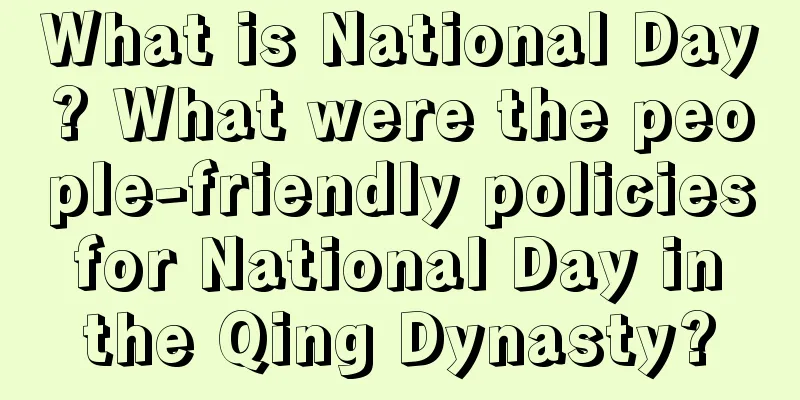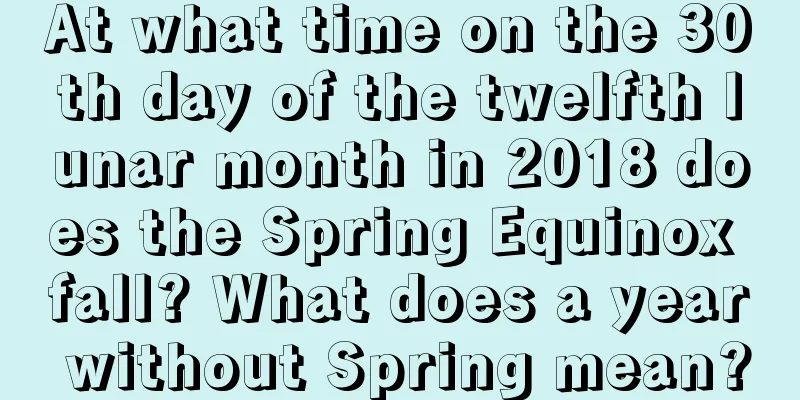What is National Day? What were the people-friendly policies for National Day in the Qing Dynasty?

The beginning of October marks the birthday of our motherland, and every family celebrates together. It is accompanied by a short holiday, and there are crowds of people everywhere. I heard that there was also a "National Day" in the Qing Dynasty. What is National Day? What were the people-friendly policies for National Day in the Qing Dynasty? The ninth month of the lunar calendar brings you not only the fragrance of golden osmanthus, but also a pleasant short holiday. In the ninth month of the lunar calendar, learn about the beauty of late autumn with Shuimoxiansheng.com.What is National Day?National Day is a legal holiday established by a country to commemorate the country itself. They are usually the country's independence, the signing of the constitution, the head of state's birthday or other significant anniversaries; some are also the saint's day of the country's patron saint.Although most countries have similar commemorative days, due to complex political relations, this holiday in some countries cannot be called National Day. For example, the United States only has Independence Day and no National Day, but the two have the same meaning. China's National Day - In ancient China, the emperor's accession to the throne and birthday were called "National Day". Today, China's National Day specifically refers to October 1, the anniversary of the formal founding of the People's Republic of China . Since the founding of New China, there have been 14 military parades during the National Day celebrations. There were 11 times between 1949 and 1959 and three times, namely, the 35th anniversary of National Day in 1984, the 50th anniversary of National Day in 1999, and the 60th anniversary of National Day in 2009. What were the people-friendly policies for “National Day” in the Qing Dynasty?After Tang Xuanzong created the "Kaiyuan Prosperity", he designated his birthday as a national holiday, named it "Qianqiu Festival", which means thousands of years, and ordered the whole country to take a three-day holiday to celebrate for himself .People-friendly policy one : Survey and repair of temple roads . Before Kangxi's 60th birthday, he issued an imperial decree ordering local officials to repair damaged temples and tombs of emperors in their areas. When Qianlong celebrated his 80th birthday, in addition to ordering the repair of temples, he also required a census and repair of roads and bridges in various provinces. This was both a reward and a preparation for the celebration. The second people-friendly policy: rewarding the elderly . An elder is an elderly person with noble virtues and respected by others. Since the "Wanshou Festival" is a celebration for birthdays, it is natural to reward those who live long lives. A banquet for a thousand elders was held on the occasion of Emperor Kangxi's 60th birthday, inviting thousands of elderly people over the age of 65 from all over the country to attend, regardless of their status, and drink together. The recorded number of participants at that time was nearly 7,000, making it the largest banquet in terms of scale and average age in Chinese history. In addition to centralized banquets, local governments also built memorial arches and awarded plaques to centenarians, and rewarded people over 65 with silver, gifts, and exemption from miscellaneous duties. The third people-friendly policy: general amnesty . During the Wanshou Festival in the Qing Dynasty, it was stipulated that "no criminal cases will be heard within one month." In addition to routine handling of routine cases, the trial of major cases was postponed for one month. At the same time, criminals would be given reduced sentences or pardons based on the specific circumstances of the case. During the Qianlong period, all exiled prisoners who had served more than ten years in prison and were law-abiding were released, and others were given commuted sentences, benefiting more than 2,600 people. People-benefiting policy four: increase the number of preferential treatment . For the vast number of scholars who wanted to enter officialdom through the imperial examination, the additional imperial examination during the Wanshou Festival undoubtedly gave them another opportunity to be promoted in officialdom. Since the first Wanshou Enke was held on Emperor Kangxi's 60th birthday, it gradually became a custom in later generations - the civil and military provincial examinations were held once every ten years, with the chief examiners in each province being dispatched by the emperor himself. The metropolitan examination after the provincial examination would determine the number of Jinshi based on the size of the province and its population. The special examination held during Cixi's birthday also increased the number of candidates for the imperial examination, giving more scholars the opportunity to enter the official career. The fifth people-friendly policy: tax exemption . Both Kangxi and Qianlong issued exemption policies during their longevity celebrations: each province would first exempt one-third of its territory, and the exemption would be completed within three years. Qianlong also implemented a tax exemption policy for disaster-stricken areas. Not only that, he was a thoughtful person and took into account that tenants employed by rich households would find it difficult to enjoy tax exemption policies, so he ordered local officials to encourage rich households to reduce tenant rents as appropriate to alleviate the burden on poor farmers. National Day meaningIt is a national symbol - National Day is a characteristic of the modern nation-state. It appeared with the emergence of the modern nation-state and has become particularly important. It has become a symbol of an independent country, reflecting the country's state system and political system.It is a functional embodiment - once the special commemoration method of National Day becomes a new, nationwide festival form, it carries the function of reflecting the cohesion of this country and nation. At the same time, the large-scale celebrations on National Day are also a concrete manifestation of the government's mobilization and appeal. |
>>: Is the second day of the eighth lunar month in 2019 an auspicious day for engagement?
Recommend
What day is March 3rd (Daughter's Day) in the Year of the Rat 2020? Is it a good day?
March 3rd has many festival nicknames: Shangsi Fes...
The lunar calendar for the 16th day of the first lunar month in 2018, is it a good day?
1. What day is the 16th day of the first lunar mo...
Which zodiac sign does a pig baby born on the eighth day of the ninth lunar month in 2019 belong to? The hexagram of the day
We know that the zodiac sign is determined by the ...
What is the Feng Shui effect of willow trees? Can willow trees ward off evil spirits?
Introduction: Because of its beautiful appearance...
Query of auspicious time on November 23, 2018, and query of auspicious and unlucky time
Every day has good and bad, auspicious and inausp...
Is the fate of a child born on August 17th of the lunar calendar good or bad? Born to be rich?
Introduction: The birth of a child is a great gift...
Are people born on the Double Ninth Festival in 2020 unusual? Are people born one day after the Double Ninth Festival good?
Introduction: People born on different days have d...
Is the third day of the twelfth lunar month in 2020 a good day? What does the almanac contain?
When the twelfth lunar month comes, the winterswe...
Is it good for a girl born on the 24th day of the first lunar month in 2019? Celebrities born on the 24th day of the first lunar month
Is it good for a girl born on the 24th day of the ...
Is the 15th day of the third lunar month in 2017 a suitable day for marriage? How are you doing?
Introduction: As the saying goes, men should get m...
Is the fate of a boy born on March 21st of the lunar calendar in 2021 good or bad? Boy's fate analysis
The fate of different boys is different. Some boys...
Is February 21st of the lunar calendar in 2018 a suitable date for traveling far away?
Introduction: With the improvement and development...
Is it a good idea to offer sacrifices on the 21st day of the sixth lunar month in 2018? What is the procedure for sacrifice?
Sacrifice is an important cultural custom in our c...
Where is the position of the God of Happiness on the fourth day of the eleventh lunar month in 2018? Check
Every day has good and bad, auspicious and inausp...
Is it a good time to get married on the 28th day of the twelfth lunar month in 2020? A complete selection of wedding couplets (with horizontal banners)!
Introduction: Marriage is an important matter, so ...









